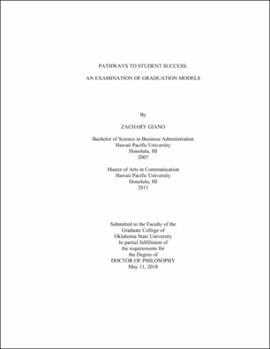| dc.contributor.advisor | Merten, Michael J. | |
| dc.contributor.author | Giano, Zachary | |
| dc.date.accessioned | 2021-08-30T15:33:44Z | |
| dc.date.available | 2021-08-30T15:33:44Z | |
| dc.date.issued | 2018-05 | |
| dc.identifier.uri | https://hdl.handle.net/11244/330748 | |
| dc.description.abstract | National high school graduation rates have been relatively stagnant, hovering around 80% for the past decade according to the National Center for Education Statistics. However, the U.S. falls short of the U.S. Department of Education's goal of a 90% high school graduation rate and ranks in the bottom among other developed countries. Because of this, it becomes imperative to examine potential models in which students are at-risk of not graduating. Using data from the Pathways to Student Success Study (a population based sample using all 7th graders in a large school district in a South Central U.S. city ; N = 1,832), two distinct models were tested, both using the binary outcome of graduated vs. dropped out. | |
| dc.description.abstract | The first analysis tested both the favorability and accuracy of 7th grade teacher's predictions of student graduation. This model was then tested with three moderators- student's/mother's/father's attitudes towards the importance of education. Results showed that 7th grade teacher's predictions were significantly related to the future graduation of their students. Findings highlight that teachers were more favorable in their predictions of female and White students (separately), while minority teachers and teachers with more teaching experience were more favorable with respect to all students. With regard to accuracy, teachers were more accurate with female students, minority teachers were more accurate only with White students, and teachers with less experience were more accurate than teachers with more experience (all statistically significant associations). Father's importance of education was found to moderate the relationship as a possible risk factor for students predicted to graduate but dropped out. | |
| dc.description.abstract | The second model used a structural equation model to test the longitudinal effects that school mobility has on graduation. The model used two levels of mediators, with the first consisting of student work ethic, parent-child closeness, and delinquent peer selection, and the second consisting of GPA and attendance rates. Without the mediators, school mobility significantly predicted dropout; however, the model fully mediated the relationship such that the original association is non-significant, and is only significant through both levels of mediators. | |
| dc.description.abstract | Findings from the present research add to the body of work examining student graduation/dropout rates by investigating predictors from middle school as opposed to the more voluminously researched high school indicators. Results generally suggest that middle school predictors are highly indicative of high school trajectories of graduation or dropout. Implications include increased indicators for at-risk students by middle school teachers, school initiatives that help with school transition, as well as caution for parents seeking to opt for school choice in early adolescence. | |
| dc.format | application/pdf | |
| dc.language | en_US | |
| dc.rights | Copyright is held by the author who has granted the Oklahoma State University Library the non-exclusive right to share this material in its institutional repository. Contact Digital Library Services at lib-dls@okstate.edu or 405-744-9161 for the permission policy on the use, reproduction or distribution of this material. | |
| dc.title | Pathways to student success: An examination of graduation models | |
| dc.contributor.committeeMember | Shreffler, Karina M. | |
| dc.contributor.committeeMember | Gallus, Kami L. | |
| dc.contributor.committeeMember | Hubach, Randolph | |
| osu.filename | Giano_okstate_0664D_15733.pdf | |
| osu.accesstype | Open Access | |
| dc.type.genre | Dissertation | |
| dc.type.material | Text | |
| dc.subject.keywords | adolescence | |
| dc.subject.keywords | dropout | |
| dc.subject.keywords | graduation | |
| dc.subject.keywords | mobility | |
| dc.subject.keywords | school | |
| dc.subject.keywords | teacher | |
| thesis.degree.discipline | Human Sciences | |
| thesis.degree.grantor | Oklahoma State University | |
